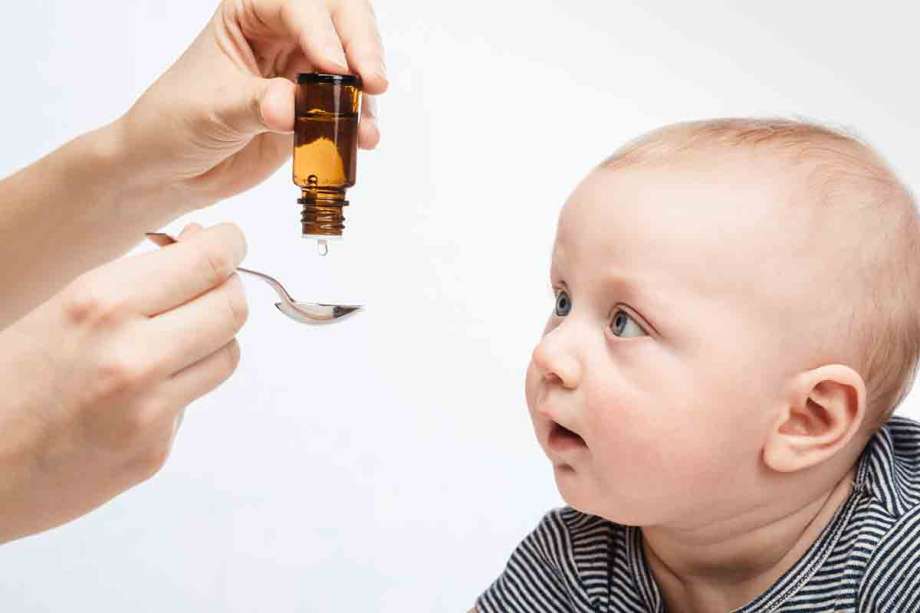Is Gripe Water Safe for Babies? (Acid Reflux, Colic, and More)

Babies cry -- It is a fact of life. However, for some, the crying never seems to stop. Many desperate parents of colicky babies, like myself, find themselves wishing and praying for a magical elixir to help soothe their baby's aches and pains. Gripe water is toted as a solution to the unsolvable curse of colic, but is it safe for babies? We investigate this product to determine if it is the cure-all answer to your child's inconsolable tears!
What Is Gripe Water?
Gripe water is an herbal supplement that contains sodium bicarbonate and a combination of herbs. These can include fennel, ginger, chamomile flower extract, passionflower extract, dill, cinnamon bark, caraway seed oil, lemon balm, clove bud oil, and cardamom seed oil. It can also contain lemon juice, agave nectar, and kiwifruit extract.
Manufacturers market this product as a remedy to acid reflux, colic, gas, hiccups, fussiness, and even teething. Seems too good to be true, right? You are not wrong.
Is Gripe Water Safe?

Gripe water contains all-natural ingredients that are safe for human consumption. In fact, these compounds have been used to solve problems with digestion, stomach upset, flatulence, and other gastrointestinal issues for hundreds of years. However, these remedies are tailored for adults. The American Academy of Pediatrics recommends that infants under the age of four months only be fed breastmilk or formula. Why?
Research indicates that "anything (including gripe water) other than breast milk administered to a baby during the first six months may increase the risk of introducing bacteria, causing allergies and irritating the baby's intestines."
Moreover, many brands of gripe water also include alcohol in the ingredients list. However, even if you purchase products that are alcohol-free, like Mommy's Bliss, it is not safe to use supplements with children under six months of age.
Gripe Water Is Not Regulated By The FDA
The Food and Drug Administration monitors medications to ensure their safety, but due to the fact that gripe water is considered a supplement and not a drug, it does not fall under their purview. This means that this product, which is positively advertised as vegan, non-GMO, organic, allergen, and gluten-free, and void of chemicals, dyes, and artificial flavors, is not actually tested or reviewed for safety.
Unfortunately, many new parents fall prey to the advice of family and friends and don't bother to do any additional research themselves. While many infants are given this product with no issue, others experience severe allergic reactions. Symptoms can include vomiting, swelling of the lips and tongue, and hives. Anaphylaxis due to an allergic reaction can occur in as little as 15 minutes. When you consider the risks, it is not worth potential rewards.
Acid Reflux: Causes & Solutions

Acid reflux is a common problem that impacts almost half of the infant population. While it normally isn't cause for concern, it can lead to excessive crying in an uncomfortable little one who has no way of articulating their problem.
Infants Are More Prone To Reflux For Two Reasons
Regrettably, acid reflux occurs because infants spend extended periods of time on their backs and they are exclusively on a liquid diet. Why do these things matter? Babies swallow a lot of air during feedings, which becomes trapped in their tummies. This results in bloating, gas, and stomach discomfort.
Additionally, when you lay them down immediately after they eat, this puts their stomach level with their esophagus, allowing the formula, breastmilk, and stomach acid to easily flow back up into their throat. Thankfully, there are some simple solutions to this problem.
Remedy 1: Adjust Feeding Techniques
One of the best solutions to this issue is to feed your child smaller amounts, more frequently throughout the day, and to take breaks throughout these mealtimes to burp them. Moreover, while feeding, keep them at an inclined or upright position and allow them to remain in this stance for at least 30 minutes after they are done. A Boppy pillow can be an easy solution for busy parents who want to take this advice.
Additionally, many parents have also found success with Dr. Brown's bottles. These pediatrician recommended products are designed with an internal vent system to help channel the air away from the nipple. This ensures a consistent flow rate of the breastmilk or formula, facilitating for a more productive feed.
Finally, if you are breastfeeding, always consider how your diet may be impacting your little one. Dairy and citrus foods are known triggers for acid reflux. Consider eliminating these items from your diet to rule them out as a cause. For those who use formula, the ingredients of your preferred brand may also be an issue. Therefore, speak with your pediatrician about potential alternatives that might better suit your baby's needs.
Hiccups Can Be Caused By Acid Reflux

Since hiccups can be caused by acid reflux, use the same remedies mentioned above. Another solution is to change out the nipples on your bottles. If the liquid if flowing too slowly or too quickly, it may be activating this condition.
Remedy 2: Get Your Baby Moving
If gas becomes trapped in your baby's stomach, it can cause extreme discomfort and irritability. When the feeding adjustments do not suffice, then lay your child on their back (after the 30-minute window following feedings), and gently move their legs as if they are riding a bike. Then after a few minutes, slowly and lightly press their legs into their tummy to help try and push out some of the gas. This can also help with constipation.
Another remedy is to engage in regular tummy time. This can reduce symptoms while simultaneously helping your baby to strengthen their neck, arm, stomach, and back muscles.
Remedy 3: Speak To Your Doctor About Medications That Can Help
If these home remedies do not do the trick, then talk to your healthcare professional about gas drops. These are made with the medication simethicone, which is not only approved by the FDA but is also considered safe to use with babies. Nonetheless, it is always best to speak with their doctor about usage, dosing, and side effects. While rare, there is always a chance of an allergic reaction to any product.
In addition, probiotics can also be a beneficial solution to an array of stomach issues in infants. For those who are unaware, not all bacteria are bad. In fact, the flora found in your gut is essential for your overall gastrointestinal health. If your child had to be on antibiotics at birth, it is likely that the good bacteria in their tummy have been eliminated and need to be replenished.
In 2014, researchers found that "prophylactic use of L reuteri during the first 3 months of life reduced the onset of functional gastrointestinal disorders and reduced private and public costs for the management of this condition." Again, speak with your pediatrician before administering any type of supplement or medication.
Always Stick To Recommended Sleep Guidelines
While laying on their back can trigger acid reflux, you should always continue to place your baby on their back to sleep. Some parents note that allowing your child to sleep at an incline or allowing them to sleep on their stomach can provide relief, but these are NOT safe options. The chance of Sudden Infant Death Syndrome is increased by using non-recommended sleep positions.
The AAP notes that "if your baby is comfortable rolling both ways (back to tummy, tummy to back), then you do not have to return your baby to their back if they roll over on their own." However, you should always initially place them on their backs and allow them to adjust their position independently.
Colic: Potential Solutions

According to the Mayo Clinic, colic is defined as "frequent, prolonged and intense crying or fussiness in a healthy infant" and it has no known cause. However, it is theorized that it could be triggered by growing pains, reflux or digestive issues, or maybe even infant migraines. This leaves many parents feeling lost, frustrated, and willing to try any solution.
Remedy 1: Try Acid Reflux Remedies
Before grabbing the gripe water, try one of the recommended remedies mentioned above. Since acid reflux and digestive system issues are assumed triggers of colic, these are recommended solutions to try!
Remedy 2: Start A Bedtime Routine
Repetition is key with kids, no matter what their age. One of the best ways to soothe your little ones is to make sure that they are relaxed during that witching hour. First, engage in recommended periods of tummy time based on their age. Then, allow them to rest and administer a feeding. Once they are satiated, a warm bath is a great soothing method and bonding experience for you two!
Immediately after the bath, take them into their room. Make sure that the lights are dim and use a white noise machine to drown out outside disturbances. Then, conduct a gentle baby massage. Next, dress them for bed and swaddle your baby, IF they are unable to flip over. Give them a pacifier and if they are still crying, don't be afraid to hush them to sleep. Finally, rock them in a repetitive motion until they calm down.
Final Thoughts
Using gripe water may seem like a simple solution, but it could have a detrimental impact on the health of your child. If none of these home remedies seem to bring relief, talk to your doctor about other, more serious health conditions that could be impacting your child.
In my case, we discovered that the colic was being triggered by gastrointestinal discomfort. However, the cause was much less common than gas or acid reflux. Instead, it was an inguinal hernia that required surgery.
Unfortunately, with this type of condition, the protrusion was occurring under my son's diaper, so the timing was everything in determining the cause of the problem. Remember that you know your child better than anyone, so look for things that may prompt these outbursts.
Finally, know that it is okay to safely set your child down in the crib and walk away for a few minutes to compose yourself. Dealing with colic is HARD. You are doing a great job and this stage will pass before you know it.

